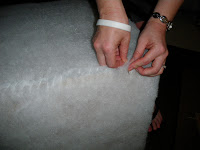October 2013 TTKD Meeting
The Story of Stuff
Thursday October 17
7.15pm for a 7.30pm start
Kenmore Library Meeting Room
The reason for Neustadt's success is simple, says Weiss. "It's all about providing financial incentives and education. We don't charge citizens anything for the recycled waste they leave out. And the less waste you put out for incineration – we've had no landfill in Germany since 2005 – the less you pay.
"Having no incentive to reduce waste is poisonous to your aims. We have a separate, visible fee that is intentionally not embedded within a local tax."
A car towing a trailer full of construction waste pulls up at the weigh-station by the entrance gate. Weiss wanders over to inspect the contents. "This weighs about half of tonne. If will cost €270 to dump it as it is. Or if the car owner sorts it into separate types of waste — timber, paper, plasterboard etc — it will cost him just €17. That, in summary, is our system. We provide a major incentive to recycle."











 thalates are added to some Polyvinylchloride (PVC and no.3 plastic) to make it more flexible and soft. However the phthalte molecules are not bound to the PVC and are able to leach or evaporate out. Some products made from PVC include food packaging, vinyl flooring, children's chew toys, pacifiers and children’s bottles.
thalates are added to some Polyvinylchloride (PVC and no.3 plastic) to make it more flexible and soft. However the phthalte molecules are not bound to the PVC and are able to leach or evaporate out. Some products made from PVC include food packaging, vinyl flooring, children's chew toys, pacifiers and children’s bottles.
(1) Corea-Téllez KS et al 2008 Estimated risks of water and saliva contamination by phthalate diffusion from plasticized polyvinyl chloride. J Environ Health.
(2) Heudorf et al 2007. Phthalates: toxicology and exposure. Int J Hyg Environ Health.
(3) Larsson et al 2009. Associations between indoor environmental factors and parental-reported autistic spectrum disorders in children 6-8 years of age. Neurotoxicology.
(4) Jaakkola et al 2008. The role of exposure to phthalates from polyvinyl chloride products in the development of asthma and allergies: a systematic review and meta-analysis. Environ Health Perspect.
(5) Kim et al 2009. Phthalates Exposure and Attention-Deficit/Hyperactivity Disorder in School-Age Children. Biol Psychiatry.
(6) Desvergne et al 2009. PPAR-mediated activity of phthalates: A link to the obesity epidemic? Mol Cell Endocrinol.
(7) Hu et al 2009. Phthalate-induced testicular dysgenesis syndrome: Leydig cell influence. Trends Endocrinol Metab.